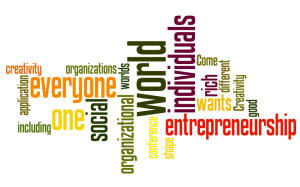Imagine two worlds: one in which everyone wanted to get rich, the other a world in which everyone wanted to do good. It is likely the images that come to mind under each scenario look very different to you.
In the world where everyone wants to get rich, you might envision individuals and the leadership of organizations assessing the environment in an attempt to find ways to shape it and operate within it to create a competitive advantage leading to higher than normal profits being earned. In this world the accumulation of wealth would stand as a strong incentive and as an interest as important and powerful as the very individuals and organizations pursuing the wealth.
 In the world in which everyone wants to do “good”, individuals and organizational leaders would act with the interests of others, including the broader society, in mind. In this world concepts such as individual rights and self-interest are balanced with the collective well-being, and issues such as equal access, social justice.
In the world in which everyone wants to do “good”, individuals and organizational leaders would act with the interests of others, including the broader society, in mind. In this world concepts such as individual rights and self-interest are balanced with the collective well-being, and issues such as equal access, social justice.
Now imagine the real world of social entrepreneurship, which is in fact, the true Third Way. Borrowing from the world in which everyone wants to gets rich, innovation and creativity is rewarded, excellence in organizational structure and processes is achieved through professional application of best practices in finance, marketing, organizational behavior, operations and strategic management. Beyond efficiency, effectiveness and creativity, social entrepreneurship is loosely-coupled, it’s viral; it’s one thousand individuals whose interests have aligned all acting independently yet in parallel, or one thousand individuals joining to form a single organization to address just one issue. Social entrepreneurship is change, the application of the change-making potential in each of us to shape the outcomes of issues played out in the institutional arenas that exist at the intersection of market and nonmarket environments.
As different as they may have seemed at first, our two imaginary worlds need one another, are complimentary to each other. As Randy Slikkers, Executive Director of Goodwill Industries, Michigan, will note during his Key Note Speech at the upcoming Inspire Conference on Social Entrepreneurship, Innovation and Creativity, if you have “No Money” then you have “No Mission”.
Come spend a day with us on Friday October 14, 2011 in the William S. White Building on the University of Michigan-Flint campus for the 2011 [in]spire conference. The conference is free and will commence with a panel session in which social entrepreneurship is defined. From there a group of local and regional talent will branch off into five tracks including: Health & Community, Engaging Youth, Going Green, Creativity and Commerce, and Getting it Done.